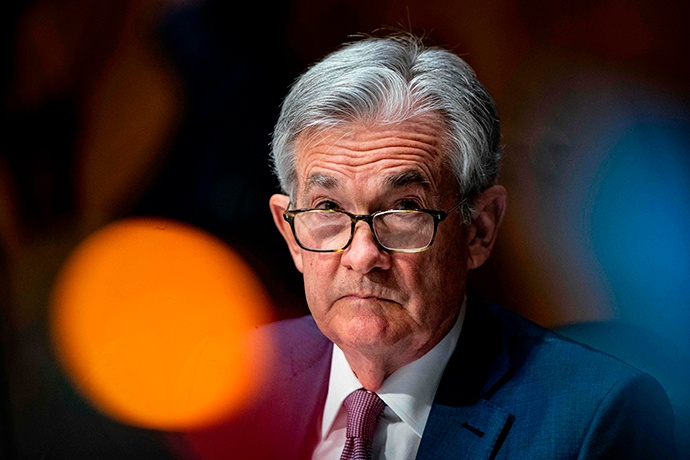Powell to Face Dual Pressure on Rate Cuts and Bank Regulation in Congress
Federal Reserve Chairman Jerome Powell will face pressure from lawmakers this week. Legislators are eager for the Federal Reserve to cut interest rates, while also expressing dissatisfaction with Powell's plan to increase capital requirements for Wall Street banks.

Fed Chair Jerome Powell will face pressure from lawmakers this week。Lawmakers are anxious to get the Fed to cut rates, while also unhappy with Powell's plan to increase capital requirements for Wall Street banks。
Congressional testimony
Powell will travel to Capitol Hill on Tuesday and Wednesday to give a semi annual monetary policy testimony. This may be his last public speech before the US presidential election, and he may have to defend the Federal Reserve's tightening policies and independence.
In June, Federal Reserve officials reduced their expectations for this year's interest rate cuts, stating that they would maintain interest rates at 20-year highs and wait for more evidence of inflation approaching the 2% target. Powell reiterated this message last week and refused to specify when to start cutting interest rates.
Recent data shows that the Federal Reserve's preferred inflation indicator slowed down in May. The market expects another inflation indicator, CPI data, to be released on Thursday, to show the smallest increase in core CPI since August last year for two consecutive months.
However, the labor market is also cooling down, and some Federal Reserve officials are warning of the risk of further slowdown. Although non farm employment growth remained strong in June, it was mainly concentrated in the healthcare and government sectors, and data from the previous few months was also downgraded. The unemployment rate has risen to 4.1%, the highest level since the end of 2021.
Calls for interest rate cuts
When Powell was questioned, the issue of interest rate cuts was inevitably the top priority. Democrats who are calling for interest rate cuts have consistently stated that high interest rates are harming consumers who have been hit by high prices. Inflation remains a focal point of concern for voters, and whether and when to cut interest rates is becoming a hot topic before the November presidential election.
At the Senate Banking Committee hearing on Tuesday, Senator Elizabeth Warren may force Powell to cut interest rates, especially after she and other Democratic colleagues wrote another letter to Powell last month requesting the Federal Reserve to follow the example of the European Central Bank to relax monetary policy.
Other Democrats are careful not to be accused of interfering with the independence of the Federal Reserve, with reports suggesting that former President Trump may attempt to limit the Fed's power after being re elected.
Prior to attending the House Financial Services Committee hearing on Wednesday, Congressman Jim Himes stated that members of Congress should not pressure the Federal Reserve to raise or lower interest rates. He said, "One of the cornerstones of our stable economy is our independent monetary policy. If we start to confuse election politics with monetary policy, the other side will do the same, and we will soon not have a stable economy."
Others believe that the call for interest rate cuts is more based on economic evaluations rather than politics.
Representative Brendan Boyle said, "We make judgments based on data and our judgment. I believe that current concerns about economic slowdown outweigh concerns about not fully achieving the 2.0% target."
He also expressed concern about mortgage interest rates, believing that the current rates are almost twice as high as before the pandemic, making housing difficult to afford and preventing people who want to relocate from selling their homes. This is consistent with the views of some economists, who believe that the Federal Reserve unnecessarily restricts economic growth.
Bank capital requirements
Powell may face not only the issue of interest rate cuts, but also sharp questions about the US plan to force Wall Street banks to significantly increase capital. In March of this year, the Chairman of the Federal Reserve stated that he expected the proposals released by US regulators to bring about broad and substantial changes, potentially requiring the eight major US banks to hold approximately 19% of additional capital to cope with financial shocks.
Republicans, including the Chairman of the House Financial Services Committee, Patrick McHenry, have criticized the Federal Reserve's preliminary plan. McHenry and other Republican lawmakers urged regulators to withdraw the proposal in September last year, citing fatal issues that could pose risks to the financial system.
Powell did not specify whether the Federal Reserve, Federal Deposit Insurance Corporation, and Office of the Comptroller of the Currency would abandon the original proposal. However, Federal Reserve officials recently presented a three page potentially modified document to other US regulatory agencies, greatly reducing the burden on large banks.
Recently, Elizabeth Warren accused Powell of giving bank executives too many opportunities to influence proposals, which may foreshadow what will happen on Tuesday. Powell insisted that the Federal Reserve does not consider political factors when formulating policies.
Disclaimer: The views in this article are from the original Creator and do not represent the views or position of Hawk Insight. The content of the article is for reference, communication and learning only, and does not constitute investment advice. If it involves copyright issues, please contact us for deletion.